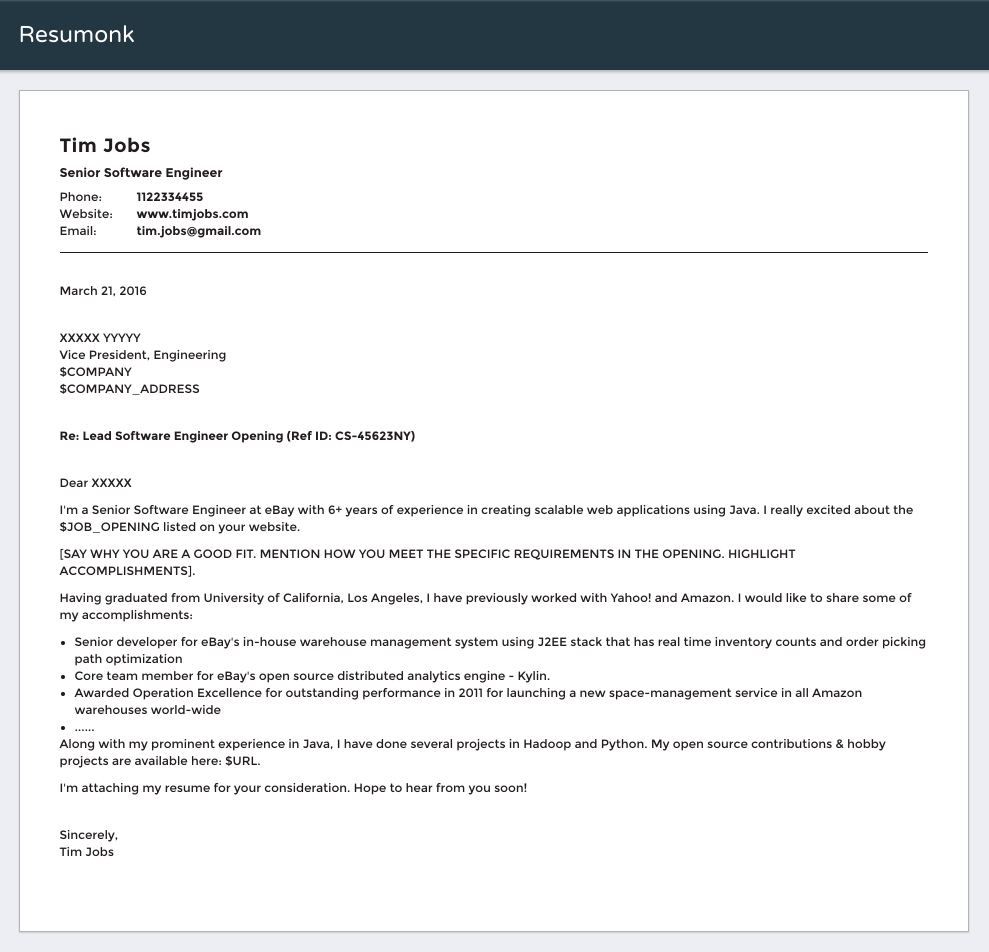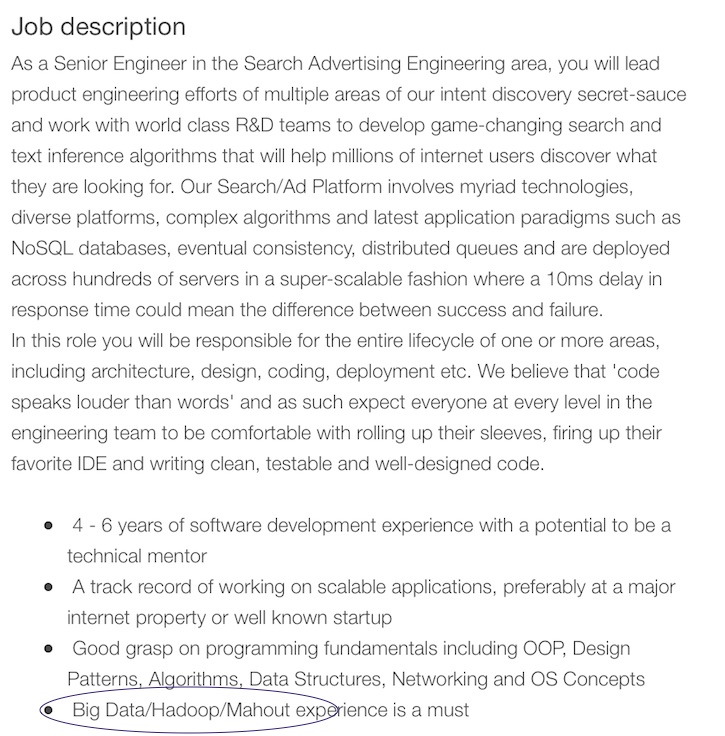
So you sent your resume to your favorite companies, and never heard back from them?
Guess what, you are not alone. Top technology companies like Google receive over 2 million job applications in a year and hire about 5000 people only. So the average applicant’s odds are 1 out of 400, says Laszlo Bock, head of people operations at Google. Presumably this includes all roles in Google, it is quite possible that odds are even lower for their engineering positions.
Admittedly, this is one of the premier technology companies, but the situation is not much different at other places as well. There is a good chance that your resume is going to be shelved without you ever figuring out the reason behind it. To not end up in the rejected pile, you must avoid the following mistakes in your software engineer resume.
If you are applying directly via a company’s website or through a job board, please stop!
As per the Impact Group study in 2010, job applications using networking or referrals are far more successful than applying online. 26.7% of external hires made by organizations came from referrals, making it the number one external source of hiring for the participating firms. 46% of men and 39% of women find their jobs through networking. The higher your salary, the more effective networking becomes.
Now that we know that referrals are the single most reliable option of landing interviews, let’s see what you can do about it-
“Hey Bob,
I saw your presentation at $CONFERENCE last year on Youtube. Great stuff; loved what you did with $FOO, in particular $COMMENT_PROVING_YOU_KNOW_WHAT_YOU'RE_TALKING_ABOUT.I'm also a $FOO developer. I noticed that your company is hiring for $ROLE. I’d love to be a part of your team. Do you have a few minutes to chat on Thursday about what you guys are doing?
Thanks,
Yourname
Your website or any public profile link”One of the biggest mistake you can make is to use the same resume for each job application. While most of the content will remain the same, it is easy to customize the headline and summary sections at the top where you can convey your fit for that particular position. You can highlight the relevant skills in your professional summary that enables the employer to quickly get a grasp of most impressive and pertinent things in your profile.
If you are using Resumonk, you can easily clone a resume and customize it for different job applications. For example, check these 2 samples below:


Given how easy and cheap it is to maintain your personal website or a blog, it is inexcusable for a software engineer not to have one these days. A blog showcases your knowledge, the kind of work you’ve been doing and since when you’ve been involved in it. It also demonstrates your writing skills and how clearly you can communicate your thoughts. Perhaps, writing is the single most useful skill to have for an engineer apart from the technical know-how itself.
It gives you a great advantage when the prospective employer can look at your site or blog and assess your fit for their work. If you don’t have one, please start right away!
Most engineers think they don’t have anything to blog. On the contrary, they easily have the most number of topic options for writing (apart from lolcats may be). One easy way is to think of blogging as a way of taking notes for your future reference.
All these make for great blog articles.
If you don’t have your website or a blog, consider including your Stack Overflow, GitHub or any other public profile link that could demonstrate your skills. These links again help establish your credibility and demonstrate your real world skills like no other. At the very least, LinkedIn profile must be added.
Lastly, when mentioning the links, please remember to write full URLs and not use hyperlinks that don’t work on printouts.
While cover letters are a big topic on their own, we want to emphasize that writing a tailored cover letter can significantly improve the quality of your application and chances of shortlisting for an interview. The great things is that writing a good cover letter can help most when you are applying without referrals! So, if you do end up applying to online postings, do pay extra attention on your cover letters. Key is to be short and sweet.
Here is a software engineer cover letter example -

Another mistake many engineers make is that they don’t properly convey their achievements. It is easy to just list your responsibilities for each previous role and move on. But, most employers, would like to know your accomplishments. For example -
‘Implemented a new algorithm to fetch the derivatives quotes with minimum market lag’ is much better than ‘Was responsible for fetching the market quotes for equity derivatives from top 6 exchanges’.
As you can see, this is achieved through using ‘phrases starting with action verbs’. Focus on what you achieved. Avoid using ‘I’, ‘Me’ in the resume and stick to third person active voice.
See how employment details are listed in this resume -

Continuing on the previous point, you can make your achievements sound much better by quantifying it. To carry on with the last example, following will sound much better-
‘Implemented a new algorithm to fetch the derivatives quotes that reduced the market lag by 65%’
Some more examples-
It is like going to a theme party in a black suit. You might be allowed to enter but you will not get the hottest dance partner! Top tech companies and startups are looking for killer projects in your profile.
Anyone can build the mundane school projects but what personal projects did you create? Did you build an expense sharing app to use among your friends? Or a budget app for your Mom? These projects show your passion for programming because you built them just for fun or utility. Good companies look for such passionate candidates.
These projects can make or break your shortlisting chances especially when your current job profile is not very lucrative. For e.g. If you are an enterprise application developer at a Bank and are applying to Google, then most probably your work might not impress them straight away. To make the cut, you need to differentiate yourself. Listing such independent projects (these could be just hobby projects or side/freelance projects) can keep you in the contention.
Again, to do this right, you need to understand the job requirement first and then, determine what kind of projects would be more relevant. Cut out old school projects and add those instead. If you don’t have any, don’t apply and first work on some projects that will be worth mentioning.
Most of the big employers and job boards use applicant tracking systems to store and manage the huge number of resumes received by them. Keyword search becomes a necessary evil here for the screening and finding the right set of candidates. e.g. They might use keywords like ‘Photoshop’, ‘Illustrator’ for a UI Designer position or ‘Hadoop’ for a Data Scientist position.
The keywords are not just restricted to tools and technologies but could also be functional titles such as ‘product manager’, ‘SEO’, ‘social media manager’ etc. So, think of what keywords are pertinent to the position you are applying for and include those in your resume to ensure that is is shortlisted in the first level filtering.
Here is a neat trick - Each job has specific requirement. They are looking for specific skills. These form great keywords to use in your resume! Does it guarantee that your resume will be shortlisted? Probably not but it is still worth trying.
For example. Look at this LinkedIn job posting -

You can pick up keywords like ‘Big Data, Hadoop’ and highlight them in your skills section (if applicable).
Here’s how a Skills section looks using Resumonk resume-

Resumes should look neat and readable on screen and if they are printed on paper. Don’t use dense blocks of text or paragraphs anywhere as they are difficult to read. Some rules of thumb are:
Do print your final version and see how it looks on paper.
Further, many candidates don’t realize what section is more important for them. Freshers might emphasize on their education background, thereby keeping the education section topmost. But for anyone with work experience, especially at known companies, Employment/Professional Experience section should be on top.
Additionally, we are trying to keep the resume under one page. Rather than having separate sections for Internships, Research Experience etc., put all work experience under ‘Employment’ or ‘Professional Experience’ to save space on the resume.
Look at this software engineer sample resume on Resumonk for proper formatting and sections layout.
You might have a long list of accomplishments in your stellar career, but still there is no justification for letting your resume run longer than 1 or max 1.5 pages. Being concise is also a skill employer is looking for. So, instead of thinking how to fit everything in a short space, think - what are things important enough to be in the first 1.5 pages?

When in doubt, go by the evergreen tenet - Show, don’t tell. Avoid cliches like ‘out of the box thinker’, ‘cross-functional product’, ‘thought leader’ etc. because they might sound cool but don’t tell much.
Focus on what you did and let your interviewer draw his conclusions. Whether you are an out of the box thinker or not is something that he can decide based on the work you have done. Don’t tell him what to think about you. This is why we emphasize on using action verbs in phrases and quantifying your achievements so that you can put your best foot forward and let the interviewer draw the right conclusions.
If possible, please ask someone else to also proofread your resume before submitting. Basic mistakes and typos can leave a bad impression about best of the candidates. Common mistake are: their vs there; its vs it’s; write vs right; than vs then
There are only very few companies or hiring managers who might be impressed by a SJCP certification. In fact, there can be times when it serves as a negative signal. Ideally, your expertise in a technology should be reflected in your projects and not in the number of certifications with your name.
Unless a job opening specifically asks for a certification or it is valuable and extremely relevant, you should leave it out of your resume. For example, If you are applying for network engineering roles that involve working on Cisco switches and routers, including a certification like CCNA might be useful.
At the end, a resume is supposed to highlight your accomplishments and skills relevant to the position that you are applying. Every line should conform to this purpose. Anything that does not add value to your candidacy should be mercilessly left out.
A well made resume that prioritizes the right information helps you get past the initial screening. During the interview, it presents you as an organized and thoughtful individual with an eye for detail. Spend some effort in making your resume stand out and it would multiply your chances of landing your dream job.
p.s. You can refer our software engineer sample resume, software engineer sample cover letter and our other well designed resume templates here.
Also, check out these remote software development jobs curated from across the web by Resumonk.
This article was originally published on our blog on Mar 12 2016 and authored by Nistha Tripathi. It was edited and republished in its present form by Team Resumonk on Sep 15 2025.